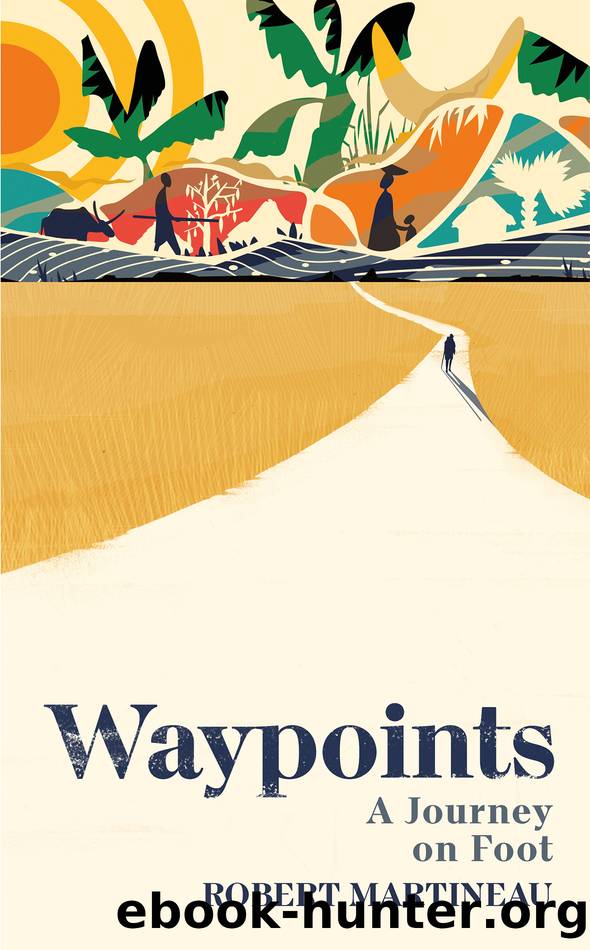Waypoints: A Journey on Foot by Robert Martineau

Author:Robert Martineau [Martineau, Robert]
Language: eng
Format: epub
Tags: Travel, Special Interest, Adventure, Sports & Recreation, walking, hiking, Social Science, anthropology, Cultural & Social, nature, Ecosystems & Habitats, Wilderness, Psychology, Social Psychology, Essays & Travelogues, Self-Help, Personal Growth, General, philosophy
ISBN: 9781473562950
Google: DnzIDwAAQBAJ
Publisher: Random House
Published: 2021-04-01T23:53:17.172746+00:00
At times Byrd wrote of almost mystical experiences, of feeling, alone in the vast white silence, a sense of oneness with everything around him. âI was conscious only of a mind utterly at peace,â he wrote during his first month, of feeling more alive than at any time in his life. He spoke of encountering a rhythm, something which communicated through the silence a connection with the world heâd not known before.
Within the waves of peace and euphoria, loneliness was never far from Byrdâs mind. When heâd first conceived of the expedition, solitude had been his primary motivation. He wanted to taste, he said, solitary quiet long enough to discover how good it really was. But as the days alone progressed, his solitude became his greatest fear. If he dwelt on it, he wrote, let it eat into him, it would be the end for him. That loneliness was too vast, he said, to face directly.
In the final months of the expedition, as â then unbeknown to him â toxic gases seeped from his stove, Byrd became sick. He became too weak to take his meteorological readings. He was barely able to tap the code messages he radioed to his expedition colleagues at Little America, too worried of endangering them to ask a rescue mission to be mounted. He couldnât keep food down. As it dawned on him that it was the stove poisoning him, he tried to limit its use, lying for hours in his sleeping bag, as the temperature in his shelter plummeted. He resolved then that he was soon to die. In those last days, reflecting on his choice, he wrote that heâd been deluded in what heâd hoped for from his mission. All that mattered, he saw then, were what had been beside him in Boston: his family, and the simple, homely things of that life.
In the final days of June, his colleagues from Little America communicated that they were sending a tractor, which was at that time of year the only way to cross the snow. He received by radio in the intervening days and weeks, updates on their progress. As he thought they might be nearing the shelter, he crawled from his trapdoor and released a flare, which he hoped would light the way for the men who were somewhere in the blizzard. As the flare died, and the darkness closed around him, standing in the cold and the dark of the ice desert, he was sensible, he said, of what he described as the ultimate meaning of loneliness.
It would be another two weeks before the tractor finally emerged through the fog. Although it was two more months after the rescue party arrived before they could make the return journey across the ice to Little America, the presence of the other men meant the ordeal was over, and Byrd began to recover. A person couldnât do without voices and touch, he later said, any more than without phosphorous or calcium, the minerals that make up our bones.
Download
This site does not store any files on its server. We only index and link to content provided by other sites. Please contact the content providers to delete copyright contents if any and email us, we'll remove relevant links or contents immediately.
Machine Learning at Scale with H2O by Gregory Keys | David Whiting(4301)
Never by Ken Follett(3943)
Harry Potter and the Goblet Of Fire by J.K. Rowling(3851)
Unfinished: A Memoir by Priyanka Chopra Jonas(3386)
Fairy Tale by Stephen King(3378)
The Man Who Died Twice by Richard Osman(3077)
Will by Will Smith(2916)
Rationality by Steven Pinker(2354)
It Starts With Us (It Ends with Us #2) by Colleen Hoover(2354)
Can't Hurt Me: Master Your Mind and Defy the Odds - Clean Edition by David Goggins(2328)
The Dark Hours by Michael Connelly(2304)
The Storyteller by Dave Grohl(2232)
Friends, Lovers, and the Big Terrible Thing by Matthew Perry(2223)
The Dawn of Everything: A New History of Humanity by David Graeber & David Wengrow(2198)
The Becoming by Nora Roberts(2191)
The Stranger in the Lifeboat by Mitch Albom(2117)
Cloud Cuckoo Land by Anthony Doerr(2107)
Love on the Brain by Ali Hazelwood(2063)
Einstein: His Life and Universe by Walter Isaacson(2014)
